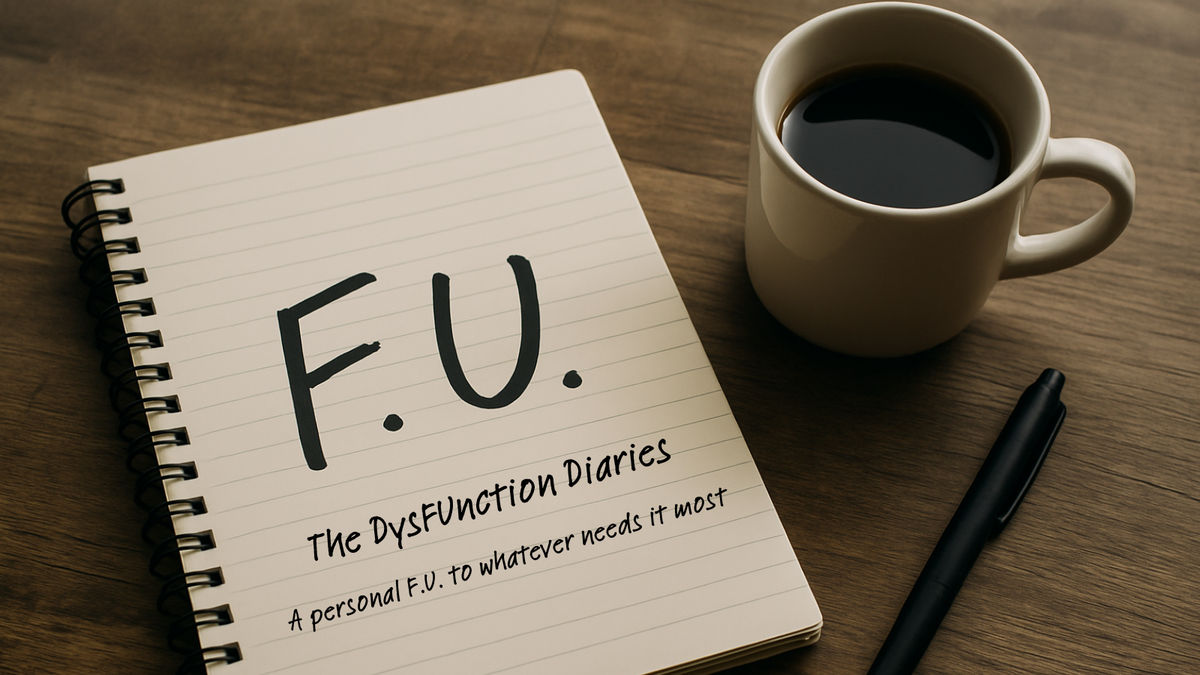The Writings on the Wall
A weekend alone made it clear that I upset people when I write the truth to try and help others. To that, as always, FU.

That title isn't a typo. Usually, the phrase “The writing’s on the wall” is a warning, a sign of what’s coming.
But this ain’t that.
Last weekend, I impulsively booked myself a hotel room, thinking I was taking a sabbatical. I needed a break, just a few days to myself where I could reset and bask in silence.
Instead, I just ended up all alone with thoughts I couldn’t outrun. Thoughts about everything that’s been changing in my life lately, with still more changes to come, whether I’m ready or not.
So, I wrote. What follows is a collection of thoughts, so it’s not so much a neat "family estrangement and dysfunction" essay, but the cleaned-up version of what came to mind as I free-wrote.
The writings on the wall.
Marcus Aurelius (the G.O.A.T.) said: To offend a strong man, tell him a lie. To offend a weak man, tell him the truth.
I’ve caught a lot of secondhand flak (because no one will say it to me directly) for writing about dysfunction. Not because what I wrote wasn’t true, but simply because I wrote it in the first place.
Apparently, the real sin is documenting the impact of bad choices, not committing them. To that I say: FU.
Writing is the only catharsis I’ve ever had (well, running too, but I’m currently sidelined with injuries, so here we are). Some people meditate. Some drink. Others ride motorcycles. I write.
I write about my lived experiences, period. If that bothers some of you, maybe you should ask yourself why.
Now, God knows I’m not perfect either. When I think back on the stupid things I did years ago—hell, hours ago —I wince.
But trust me, it’s gonna make great fodder for my future stories. Maybe you’ll laugh at my ignorance and feel a little better about your own.
The difference is that my choices never put anyone in danger, broke any laws, or left any collateral damage. They were my choices to own, and I do.
Real dysfunction leaves damage, the kind you can't always see but can most definitely always feel. But I’m rehashing that mess right now; it’s already been said to death.
Part of moving on is working through it.
The truth is that I don’t just write because I’m pissed off or feeling a certain kind of way. I also write when I’m sad.
Especially when I remember what family used to be for me.
Gatherings at my grandparents’ home weren’t fancy, but God, how we looked forward to them. We looked forward to being together, playing games, eating great food, being silly, and sometimes being raucous.
Then my grandparents died, and all of those moments became distant memories as my family fell apart.
When I married my husband, I thought maybe I’d found it again. He had a familial cast of characters I couldn’t wait to be a part of.
I wanted to learn their stories, celebrate milestones, and create memories. And with some of them, I did from the start.
But over time, others already distant peeled away one by one. Bias and immaturity. Arrogance. Perceived slights and stale grudges.
That “big happy family” I’d envisioned dissolved. Then I realized it never really existed outside my own wishful thinking.
So, why was I sad and tearfully reminiscing about families, you might ask? Well.
I was sitting alone in that damn hotel room when I stumbled upon a rerun of My Big Fat Greek Wedding. I’ve seen it a hundred times (the sequels, not so much).
I didn’t expect to cry, but I did. Chalk it up to exhaustion, anxiety, frayed nerves, whatever, but my emotions were already dialed up to 11.
There I was, watching two people so in love that nothing could come between them. Hearing him tell her he “came alive” when they met made me cry.
Watching him prove, over and over, that she was always worth choosing. That made me cry.
Watching that big, loud, affectionate family celebrate together. That made me cry, too.
Watching mothers and daughters have a poignant, generational moment the day before the wedding. The cacophony of the 'morning of' bridal preparations with the family.
When I married my now-husband, we ran off to escape the family drama our relationship had created and married in private.
While I have never regretted that choice, remembering I’d never get that sort of moment made me cry.
Because in the end, after all is said and done, it feels like such a damn waste of life to spend years fighting your own bloodline.
All I’ve ever wanted - what most people want - was just a place where everyone was welcome, and stayed, even when life got hard.
I mean, isn't that what family is supposed to be?
Want the next one?
Things are changing within the family I care for, and goodbyes might be coming soon, at least for one of us.
At the same time, I understand the instinct to keep protecting; it runs deep and comes from love. But love doesn’t always make sense.
I’ve learned the hard way that you can exhaust yourself digging for logic in places it doesn’t exist. And because love doesn't always make sense, all you can do is just accept it.
And it’s easy for bystanders to say I chose this battle and that I should accept the bed I made. Maybe that’s true.
But even chosen battles can break you down in ways you couldn’t possibly see coming.
What I hope, more than anything, is that as we move forward, we remember we don’t have to keep fighting the same battle to prove our love or our strength.
I wish being a writer made this easier. But my brain runs so hot with raw data that I can’t even sort it into coherent thoughts some days, much less complete sentences.
But what I do know is this: I want what’s best for everyone involved. That will mean changes, and it may mean goodbyes.
It will definitely mean learning to let go of things I’ve held onto far too long.
Not everything can be explained or solved. Some of it just has to be accepted, even when it makes no sense on paper.
All I know is I can’t keep drawing from a well that’s running dry. Somehow, there has to be a way to honor the pain and still choose my own healing.
At the end of the day, I will always speak the truth and stand by my words, even if sometimes they’re opinionated, crass, or downright petty.
I’m only human, after all.
But maybe change isn’t just loss; maybe, just maybe, it can be the chance for peace where there’s always been conflict, healing where there’s been hurt.
I don’t know yet if that’s what waits on the other side for us, but, for the first time in a long time, I believe it could be even better.
While we wait, I'll continue to name things for what they are, not what people wish they were.
And to anyone who thinks I'll stop now? FU. I won't.
If you'd like to support the work, here's where to do it.
If this made sense to you, subscribe. If it didn’t, maybe the next one will.
I am nothing if not versatile.
Recommended Reads
- This is the current chapter of estrangement, but the origin is in The Silence Was a Choice.
- For another take on survival, see Beautiful Lies.
- The emotional fallout overlaps with Enough.
Heather Papovich is the voice behind Unfinished Business, a weekly essay series where real life meets pop culture, and how to get through both without (mostly) losing it.




